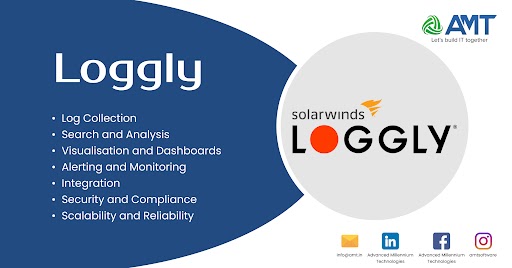Loggly is a cloud-based log management and analysis service that allows organizations to collect, analyze, and visualize their log data in real-time. It provides features such as log aggregation, search, monitoring, alerting, and reporting. Loggly supports a wide range of log sources including applications, servers, and cloud infrastructure. It’s commonly used by DevOps teams, developers, and IT operations personnel to gain insights into their systems, troubleshoot issues, and ensure the health and performance of their applications and infrastructure.
Some additional details about Loggly:
- Log Collection: Loggly supports various methods for collecting log data, including HTTP, Syslog, and agents for popular platforms like Linux, Windows, and Docker. It also integrates with numerous third-party services and platforms, such as AWS, Azure, Heroku, and more, allowing users to centralize logs from diverse sources.
- Search and Analysis: Loggly provides powerful search capabilities that enable users to quickly search through large volumes of log data using a simple yet expressive query language. It supports filtering, faceted search, and Boolean operators to help users pinpoint specific logs or trends within their data.
- Visualization and Dashboards: Users can create custom dashboards and visualizations to gain insights into their log data. Loggly offers various chart types, including line charts, bar charts, and pie charts, allowing users to visualize log data trends, patterns, and anomalies.
- Alerting and Monitoring: Loggly allows users to set up alerts based on predefined conditions or thresholds. These alerts can be configured to notify users via email, Slack, PagerDuty, or other communication channels when certain log events occur, enabling proactive monitoring and issue resolution.
- Integration: Loggly integrates with popular tools and platforms in the DevOps ecosystem, such as Slack, PagerDuty, JIRA, GitHub, and more. This allows for seamless workflow automation and collaboration between teams.
- Security and Compliance: Loggly provides features to ensure the security and integrity of log data, including role-based access control (RBAC), encryption, and compliance with industry standards such as GDPR, HIPAA, and SOC 2.
- Scalability and Reliability: As a cloud-based service, Loggly offers scalability to handle large volumes of log data efficiently. It provides high availability and redundancy to ensure uninterrupted access to log data and analysis tools.
Overall, Loggly offers a comprehensive log management solution designed to help organizations monitor, troubleshoot, and optimize their systems and applications effectively.
Here are a few more aspects of Loggly:
- Log Parsing and Parsing Rules: Loggly allows users to define parsing rules to extract structured data from log messages. This helps in standardizing log formats and making the log data more easily searchable and analyzable.
- Field Extraction: Loggly enables users to extract specific fields from log messages automatically or through custom parsing rules. This facilitates better organization and categorization of log data, making it easier to analyze and visualize.
- Retention and Archiving: Loggly offers options for data retention and archiving, allowing users to specify how long they want to retain log data in their account. This helps in complying with data retention policies and regulations while also managing costs effectively.
- API Access: Loggly provides RESTful APIs that allow users to programmatically interact with their log data, perform searches, retrieve logs, and perform administrative tasks. This enables integration with custom tools and workflows.
- Performance Monitoring: In addition to log management, Loggly offers features for performance monitoring, allowing users to track key performance metrics and identify performance bottlenecks in their applications and infrastructure.
- Log Anonymization: Loggly supports log anonymization features to help organizations protect sensitive information in their log data. This is particularly important for compliance with data privacy regulations and standards.
- Customization and Extensibility: Loggly allows for customization and extensibility through various means, such as custom dashboards, saved searches, and integration with third-party tools via APIs and webhooks.
- Community and Support: Loggly provides resources such as documentation, tutorials, and a community forum to help users get started and troubleshoot issues. Additionally, it offers different levels of support plans to meet the needs of various organizations, including email support, phone support, and dedicated technical account managers for enterprise customers.
These additional aspects contribute to making Loggly a robust and flexible solution for log management and analysis, catering to the needs of both small businesses and large enterprises across various industries.
Above is a brief about Loggly. Watch this space for more updates on the latest trends in Technology.
